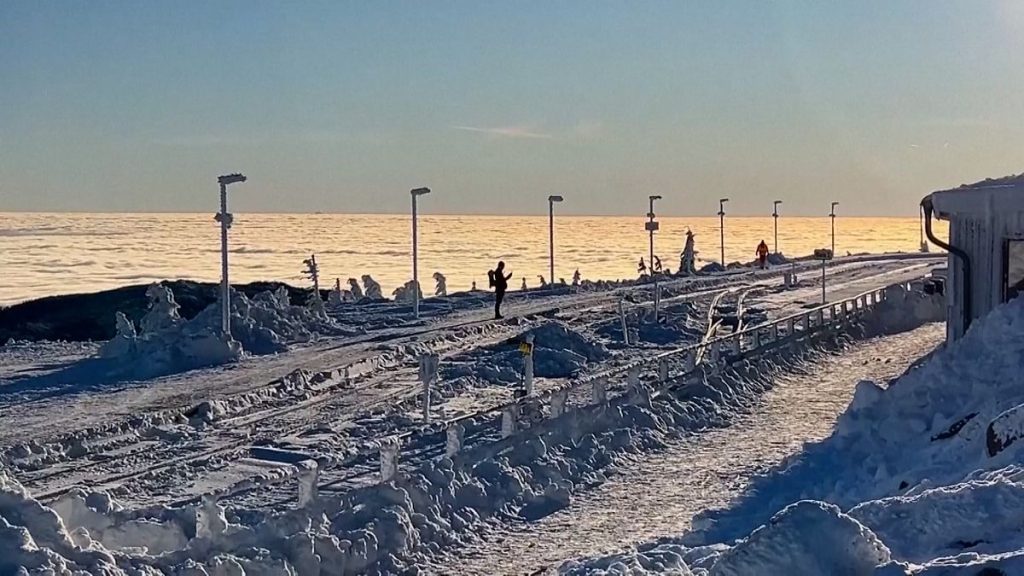The Brocken, the highest peak in the Harz Mountains of central Germany, reaches an elevation of 1,141 meters above sea level. This imposing mountain, shrouded in folklore and known for its unique atmospheric phenomena, serves as a dramatic backdrop to a recent wave of extreme winter weather that has swept across Europe. The continent has been gripped by heavy snow and sub-zero temperatures, leading to significant disruptions, particularly impacting travel and transportation. The United Kingdom and Germany have been especially hard hit, experiencing widespread flight cancellations and delays as major airports struggled to cope with the challenging conditions. The freezing temperatures, coupled with heavy snowfall, have created hazardous conditions on roads and railways, further complicating travel and impacting daily life.
As Europe grapples with the effects of this harsh winter weather, a contrasting scene unfolds in the Polish spa town of Kołobrzeg. Here, a thousand hardy individuals have gathered not to seek shelter from the cold, but to embrace it. Undeterred by the freezing temperatures, strong winds, and high waves of the Baltic Sea, these winter swimming enthusiasts participate in an annual festival, a testament to human resilience and the pursuit of unique physical and mental challenges. This juxtaposition of the disruptive power of nature and the human drive to engage with it, even in its most extreme forms, highlights the complex relationship between humans and the natural world.
The winter swimming festival in Kołobrzeg serves as a stark contrast to the disruptions caused by the extreme weather elsewhere in Europe. While airports are forced to ground flights and roads become treacherous, these individuals find joy and invigoration in the icy waters. Their participation is a celebration of human adaptability and the ability to find connection and community in shared experiences, even in the face of challenging conditions. This annual tradition highlights the cultural significance of such events, demonstrating how communities can come together to celebrate resilience, overcome adversity, and find meaning in pushing physical and mental boundaries.
The extreme weather conditions sweeping across Europe underscore the increasing impact of climate change on weather patterns. While winter storms are a natural occurrence, the intensity and frequency of these events appear to be increasing, leading to more significant disruptions and highlighting the vulnerability of modern infrastructure to extreme weather. The challenges faced by transportation networks, particularly air travel, underscore the need for increased preparedness and resilience in the face of these changing weather patterns. The response to these weather events will require a multifaceted approach, including investments in infrastructure improvements, improved forecasting and warning systems, and strategies to mitigate the impacts of climate change.
The contrasting images of the snow-covered Brocken and the icy waters of the Baltic Sea, filled with winter swimmers, offer a powerful visual representation of the duality of nature. On one hand, nature’s power can be disruptive and even destructive, impacting human activities and posing challenges to our way of life. On the other hand, nature can also be a source of inspiration, challenge, and even joy, providing opportunities for personal growth, community building, and a deeper connection with the natural world. The winter swimming festival in Kołobrzeg serves as a reminder that even in the face of adversity, humans can find ways to connect with nature and celebrate its power.
The winter of 2025 in Europe, marked by both disruptive weather patterns and the inspiring gathering of winter swimmers, provides a valuable lens through which to examine our relationship with the natural world. It highlights the need for increased adaptation and resilience in the face of climate change, while simultaneously demonstrating the enduring human spirit that seeks connection, challenge, and celebration even in the midst of challenging conditions. The events of this winter serve as a reminder of the complex interplay between humans and nature, and the importance of finding a sustainable and harmonious balance between our needs and the environment.














